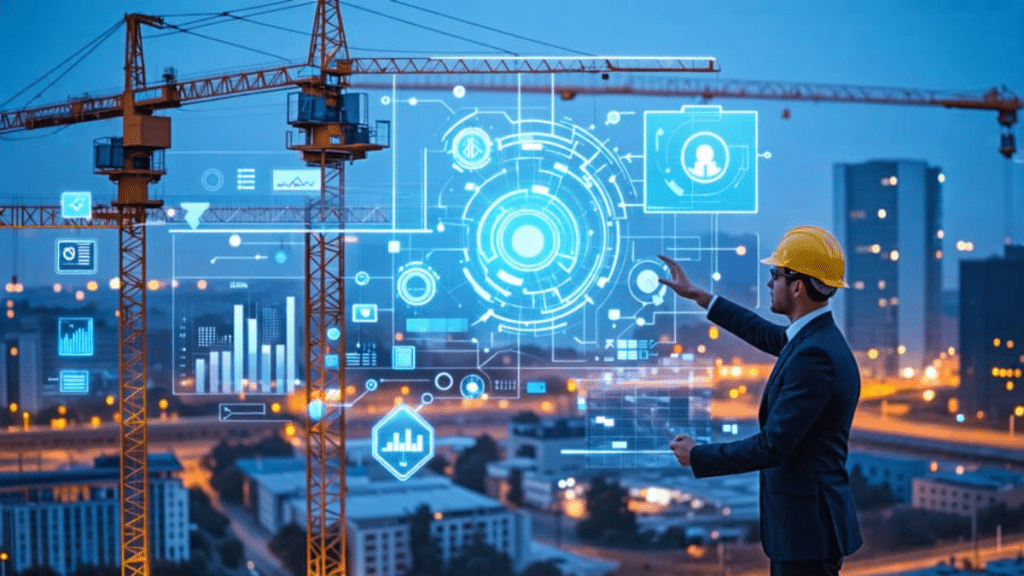The construction industry has long been associated with complex planning, unpredictable delays, and costly inefficiencies. However, the integration of artificial intelligence (AI) and machine learning is reshaping the way projects are managed, offering smarter, faster, and more accurate decision-making processes. From predictive analytics to automation, AI is transforming construction project management at every stage. Companies leveraging AI construction tools are gaining a competitive edge by enhancing productivity, reducing risks, and optimizing workflows.
With machine learning-driven insights, construction firms can make data-backed decisions that improve efficiency while maintaining high safety and quality standards. As the industry embraces digital transformation, AI is becoming an essential tool in tackling the challenges of modern construction.
Enhancing Planning and Design with AI
Project planning is one of the most critical aspects of construction management. Traditionally, planning has relied on human expertise and historical data, but AI-driven tools now offer a level of accuracy and foresight that was previously unattainable.
Machine learning algorithms analyze past project data, market trends, and environmental factors to generate detailed forecasts, helping teams create more reliable construction schedules. AI-powered design software also streamlines architectural planning, identifying potential structural issues before construction begins. By reducing design errors and optimizing resource allocation, AI ensures that projects start with a solid foundation.
Incorporating AI into Building Information Modeling (BIM) allows for real-time collaboration and predictive modeling, improving overall project coordination. AI-enhanced BIM can identify cost-effective alternatives, assess sustainability factors, and enhance energy efficiency in building design.
Automating Construction Site Management
Construction sites are dynamic environments where unforeseen challenges frequently arise. AI-powered automation is improving site management by tracking progress, monitoring safety compliance, and optimizing resource distribution.
Drones equipped with AI technology provide real-time aerial surveys, capturing high-resolution images and videos for progress tracking. These insights allow project managers to compare actual site conditions with digital models, identifying discrepancies and preventing costly delays.
Robotic process automation (RPA) is also being used to handle repetitive tasks, such as site inspections and material inventory management. AI-driven robotics can operate construction machinery with precision, reducing the need for manual labor in high-risk environments. This not only enhances efficiency but also improves worker safety by minimizing exposure to hazardous conditions.
Predictive Analytics for Risk Management
Risk assessment has traditionally relied on manual evaluations and industry experience. AI revolutionizes this process by analyzing vast amounts of data to identify patterns that indicate potential risks.
Predictive analytics can assess factors such as weather conditions, labor availability, and material shortages to anticipate project disruptions. By detecting risks early, construction managers can take proactive measures to mitigate delays and cost overruns.
AI also plays a crucial role in workplace safety by identifying potential hazards before incidents occur. Wearable technology equipped with AI sensors can monitor workers’ movements, detect fatigue, and provide real-time alerts to prevent accidents. By integrating AI-driven safety measures, construction firms can significantly reduce on-site injuries and improve compliance with regulatory standards.
Optimizing Cost and Resource Allocation
Budget overruns are a persistent challenge in construction, often caused by inefficient resource allocation and unexpected expenses. AI-driven cost estimation tools analyze historical data, market fluctuations, and project requirements to generate precise budget forecasts.
Machine learning algorithms help construction managers optimize material procurement, ensuring that resources are sourced cost-effectively while minimizing waste. AI-powered supply chain management tools can predict demand, automate ordering processes, and identify alternative suppliers to prevent delays.
Labor productivity is another area where AI enhances efficiency. By analyzing workforce performance data, AI can recommend scheduling adjustments and task assignments to maximize productivity. These insights enable project managers to allocate human resources more effectively, ensuring that deadlines are met without unnecessary labor costs.
Improving Collaboration and Communication
Effective communication is essential for successful project management, yet misalignment between stakeholders is a common issue in construction. AI-powered collaboration platforms centralize project data, ensuring that architects, engineers, contractors, and clients have access to real-time updates.
Natural language processing (NLP) and AI-driven chatbots are improving communication by providing instant responses to project-related queries. These tools assist in document management, automate report generation, and facilitate seamless information sharing across teams.
Virtual assistants powered by AI help project managers stay organized by scheduling meetings, tracking deadlines, and sending automated reminders. By reducing administrative burdens, AI enables teams to focus on strategic decision-making and on-site execution.
The Future of AI in Construction
As AI technology continues to evolve, its role in construction project management will only expand. Future developments may include fully autonomous construction sites, where AI-driven machinery completes tasks with minimal human intervention. The integration of AI with the Internet of Things (IoT) will further enhance real-time monitoring, providing deeper insights into equipment performance and structural integrity.
Sustainable construction will also benefit from AI advancements, with smart algorithms optimizing energy consumption, reducing material waste, and promoting eco-friendly building practices. AI-powered simulations will allow architects and engineers to test different construction scenarios, ensuring that projects meet environmental and efficiency goals.
While AI is not a replacement for human expertise, it serves as a powerful tool that enhances decision-making, streamlines operations, and mitigates risks. The construction industry is entering a new era where AI-driven innovation will define project success, making construction safer, faster, and more cost-effective.
Embracing AI for Smarter Construction
The adoption of AI in construction is no longer a luxury—it is a necessity for staying competitive in a rapidly evolving industry. Companies that leverage machine learning for project management gain the advantage of data-driven insights, automated workflows, and enhanced efficiency. From predictive analytics to smart automation, AI is revolutionizing the way construction projects are planned, executed, and managed.
As technology continues to advance, the construction sector must embrace AI-driven solutions to build smarter, safer, and more sustainable structures. The future of construction is not just about erecting buildings—it is about designing intelligent, responsive environments that optimize performance at every level.
